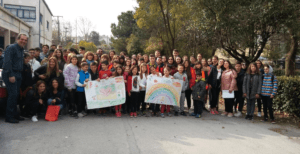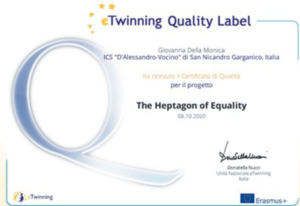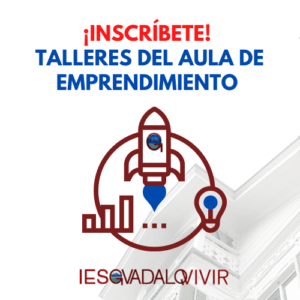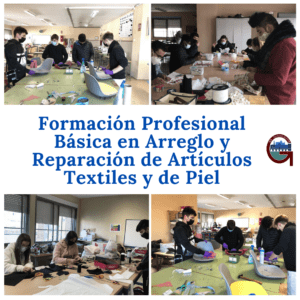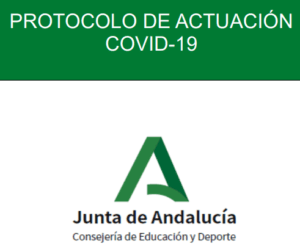Category Archives: Erasmus+
Project Summary
The primary aim of the «Climate Change Agents» project is the integration of Climate Change Learning into the partner schools’ curricula as part of their shared long-term vision of a Whole School Approach towards promoting Social Inclusion and combating Early School Leaving. The pupils of all partner schools come from socially and economically disadvantaged backgrounds. By developing our pupils into Climate Change agents, our project aims to develop the key literacy and digital competences of pupils as well as their civic competences. This project is a key strategic step in our continued interconnected work with two European level projects: the Erasmus + KA229 project «We are European, We are Equal» (developed by three of the project members) and «Climate Action Agents of Change,» our ongoing eTwinning project. «Climate Change Agents» fits with the European Commission’s priorities for 2019-2024 alongside the National Horizontal priority of Social Inclusion and the specific priority for the School Education sector of Early School Leaving.
The objectives of the project can be split into pupil, teachers, and stakeholder categories: For pupils, we continue our strategic plan of improving attendance using prevention, intervention and compensation strategies to re-engage early leavers; as climate change has been chosen by pupils as the main theme to motivate them to stay in education, we want to raise awareness about climate change and sustainability for the most vulnerable; and finally to promote Social Inclusion, we want our pupils to be fit for the digital age by developing their digital competences through eTwinning. For teachers, we will share Whole School Approach strategies to prevent early school leaving; we will offer training to identify early signs of social exclusion and the necessary tools to help integrate pupils; we will strategise the integration of Climate Change education into the curricula; and teachers will improve their digital competences. For other stakeholders, we will raise awareness about the vulnerability of families from disadvantaged backgrounds in the issue of climate change; we will empower families through new alliances with the schools to support them dealing with social exclusion; and we will encourage the involvement of parents in networks connected to the school to prevent Early School Leaving.
The «Climate Change Agents» project will involve 180 pupils aged 12-14. We estimate that over 1000 pupils will be indirectly impacted by the activities in the partner schools during the project and post-project. There will be 12 teachers involved as part of the Steering Committee plus 24 more teachers as part of the coordination and implementation teams. There will also be 360+ parents and family members impacted by the creation of new synergies of Social Inclusion and reducing Early School Leaving as well as steps towards combating the impact of Climate Change on the most vulnerable. For pupils, key activities include a peer mentoring scheme to be completed on eTwinning and in person during mobility trips, workshops on 7 key areas of Climate Change, and multi-disciplinary group projects to develop digital competences. For teachers, key activities include seminars and workshops on a Whole School Approach to promoting Social Inclusion and Combating Early School Leaving through the integration of Climate Change Education into school curriculum.
We envisage clear manageable, measurable, and achievable results for all those involved: For pupils, the results will be the development of key academic and civic competences through collaborative learning during mobility trips and on eTwinning, the development of their knowledge of Climate Change, and the long-term improvement in their attendance alongside lower levels of Early School Leaving. For teachers, the results will be the realisation of the successful Integration of Climate Change in each partner school’s curriculum, the development of new physical and digital teaching resources, and the development of teachers’ digital competences. For stakeholders, particularly parents, the results will be the support networks to ensure their children stay in education and break the cycle of social exclusion.
The «Climate Change Agents» project has long term benefits for all involved. For pupils, we are certain that by integrating Climate Change Learning into the curriculum and delivering this learning through the development of key competences will motivate them to stay in Secondary Education and break the cycle of Social Exclusion. For teachers, we are certain that they will realize the vision of a Whole School Approach to combatting Early School Leaving and Social Exclusion through the development of the school curriculum and their pedagogical practices. And for parents, we are certain that the project will empower them to encourage their children to stay in education and break the cycle of Social Exclusion.
European Development Plan
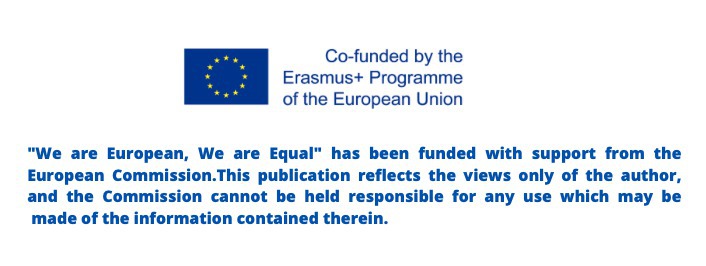
EUROPEAN DEVELOPMENT PLAN
At IES Guadalquivir we are currently in a European Development Plan with the aim of combating Early School Leaving. We are a secondary school located in a disadvantaged area of Córdoba, Spain. Families face social exclusion in this area due to unemployment because of a lack of qualifications caused by Early School Leaving. Put simply, pupils simply do not finish compulsory education as families do not see education as a key to facilitate their children’s social inclusion.
Our European Development Plan started with an eTwinning project on promoting Social Inclusion and combating Early School Leaving. In 2017, the school started using the eTwinning platform to build a network with suitable European partner schools. In 2018 we were awarded funding for the Erasmus+ KA229 project “We are European, We are Equal.” This project has enabled staff and pupil mobilities to continue the development and integration of strategies, policies, and activities to combat Early School Leaving and promote Social Inclusion in all partner schools. With only 8% of pupils completing compulsory education at IES Guadalquivir, we believe that the inevitable result of ESL – social exclusion – is the central factor in this continuing cycle of underachievement.
Within this context, our European Development Plan is centred on mobility and cooperation and identifies the following three main needs:
- To combat Early School Leaving (ESL), we have identified the need for a “Whole School Approach.” Cohesive, collective, and collaborative action with all of those involved in the school community is essential. In line with the EU priority across EU Member States of reducing ESL to less than 10%, effective leadership and governance our priority in the strategic development of competences to ensure teachers are able to respond to the complex challenges that they face in combating ESL.
- The second need is the development of key competences in digitalisation. There needs to be continual development in the school of the competences and skills of both staff and pupils needed to address educational disadvantage and student disengagement. Despite the great success that we have had with eTwinning, due to a lack of resources, only a small proportion of teachers at IES Guadalquivir use digital platforms. The school needs to continue offering staff training and support to continue incorporating such tools in their teaching. This will also encourage and support the development of the digital skills of the pupils inside the classroom and also in everyday life.
- To promote social inclusion, we have identified the need to incorporate Climate Change into the school curriculum. Motivating and ensuring that each child has an equal chance to access, participate, and benefit from inclusive education and an inclusive experience in society secondary level education. In line with the new Digital Education Action Plan (2020-2027) objectives, we want to promote equity, social cohesion, active citizenship and sustainability in preparation for future life after compulsory education.
Having identified these three main needs in IES Guadalquivir, our goals with regards to European mobility and cooperation are:
- To meet the need of combating Early School Leaving, the primary goal is to adopt a holistic and collaborative “Whole School Approach” to combating ESL and promoting Social Inclusion.
- The second goal is to realise the school’s commitment towards investing in continuous professional development of the staff to develop competences in digitalization.
- Support the planned expansion of Climate Change as a key part of the curriculum of IES Guadalquivir within the planned time frame of 3 years.
In line with the needs and goals of our Erasmus+ projects, our expectations through professional mobility and European cooperation are:
1.A progressive improvement of ESL rate in the school
- Improvement in staff digital competences
- Increasing the knowledge and learning from the expertise of experienced peers in another European country.
Memorandum

[googleapps domain=»docs» dir=»document/d/e/2PACX-1vSoX9pQ_SlXvRYDHR0dHoDAedJX_zlI-VHoybtq26M36YGEIh5u81q0TNTc_G2rTvEf_yR_tx8UuwKO/pub» query=»embedded=true» /]
Assessment Report

A report collecting and analysing qualitative and quantitative data to assess the impact of our Erasmus+ project.
[googleapps domain=»docs» dir=»document/d/e/2PACX-1vSSkt_Jl2rHx8nDj_9lFpj3iirzsNFHkr6CxWJqZuoowB8oF7hvd5SbDGYp7Tw6cyj-DXWijocl0D3L/pub» query=»embedded=true» /]
Oral Archives

A collection of Oral Archives produced throughout the project
[googleapps domain=»docs» dir=»document/d/e/2PACX-1vSdeP9zpLTBJSF1LnQrw4_G1a09oX-mPp6FOBYyqgDerdKyKCw8zhWMw3oNfgJ8FNLUaZfcpnfq8wA7/pub» query=»embedded=true» /]
Project Partners

| WE ARE EUROPEAN, WE ARE EQUAL PROJECT PARTNERS |
IES Guadalquivir, Córdoba, Spain (Coordinator School)
https://blogsaverroes.juntadeandalucia.es/14700705/
3rd Gymnasio of Naoussa, Naoussa, Greece
IC D’Alessandro Vocino, San Nicandro Garganico, Italy
Project Twinspaces (Blogs)

We are European, We are equal Twinspace: https://twinspace.etwinning.net/50758/home
The Heptagon of Equality Twinspace: https://twinspace.etwinning.net/92542
We are European, We are Equal Communication Kit

| COMMUNICATION KIT |
[googleapps domain=»docs» dir=»document/d/e/2PACX-1vSsahh01pWmr0pe33zlj6uaIbqHIYLOjmldGg9KzzvCbXcPQ_kNss2OBuRBq6HfxLsZKWM_CBy_GGvY/pub» query=»embedded=true» /]
Social Media Channels
Twitter: https://twitter.com/we_are_european?lang=en
Facebook: https://www.facebook.com/weareeuropeanweareequal
Instagram: https://www.instagram.com/we_are_european/?hl=en
Telegram: https:t.me/WeAreEuropean
Youtube Channel: https://www.youtube.com/channel/UCvhmqs-m-kWbO02W5b0eTDQ
«We are European, We are Equal» Project Summary

| WE ARE EUROPEAN, WE ARE EQUAL PROJECT SUMMARY |
The primary motivation for the «We are European, We are Equal» project was the collaborative development and implementation of strategies, activities, and competences at the European Level to tackle the interrelated issues of Social Inclusion and Early School Leaving. These issues are due to the lack of key competences of the pupils, particularly the basic skills of literacy, language, and digital competences, as well as personal, social, and civic competences which themselves are due to next to none of the pupils having travelled or collaborated with people from other European countries. The activities for the pupils – group work, intercultural exchanges, digital activities on Twinspace, and the recording and production of the Open Oral Archive – were formed around the 7 themes of the Heptagon of Equality. The teacher training events that also form a key part of the project aided the development of pedagogical practices linked to a key competence approach and supported teachers to incorporate these methods into their school curricula. The project also aimed to support other stakeholders, namely pupils and parents, to support their children to stay in education.
The objectives of the project were split into pupil, teacher, and stakeholder categories: For pupils, it encouraged them to participate fully in the project by educating them on the value of collaborative exchanges and the developing of personal, social, and civic competences; it established improved attendance, participation in lessons, and development of literacy, language, and digital competences; and, in the long term, the project supported pupils to complete their compulsory secondary education and improve means of Social Inclusion. For teachers, the project supported them to evolve their pedagogical approach to integrate competence-based learning and multidisciplinary activities to address learning disparities; and offered training for teachers with colleagues in other EU countries to work with management and other stakeholders, particularly families, to tackle Early School Leaving. And for stakeholders, the project established the involvement of family members in Parents Associations and other networks connected to the school in order to support their children.
The «We are European, We are Equal» project has involved 64 pupils directly aged 12-14. Over 300 pupils indirectly took part in the activities in the partner schools during the project and post-project. There were 9 teachers involved as part of the Steering Committee plus 20 more teachers as part of the coordination and implementation teams. There were also over 200 parents impacted by the activities and the creation of new synergies of Social Inclusion. The pupils participated in preparatory workshops for their mobility trips, produced recordings on social exclusion and ideas for social inclusion during the mobilities, and presented their findings in workshops in their own schools post trip. For pupils, this Project Based Learning approach was key to the development of their key competences by working together at the European level over an extended period of time. For teachers, using a Collaborative Project Management approach allowed them to plan and control the process and enabled them to create synergies around information, communication, and collaboration during and post-project.
We produced a range of tangible and intangible results for all of those involved in the project. For pupils, the tangible results were the material and digital outputs, specifically an Oral Archive of pupils’ experiences linked to the project themes; while the intangible were the development of key competences which in turn improved attendance levels and increased the likelihood of finishing compulsory education. For teachers, the tangible results were the production of collaborative teaching resources and development of new curricula; while the intangible were the development of synergies that increased the capacity to operate at a transnational level in the sharing of ideas, practices and methods. And finally, for stakeholders, the tangible results were the production of materials in workshops to create a stronger network; while the intangible results included the establishment or nurturing of new associations involved in the welfare of their children.
The «We are European, We are Equal» Project had long term benefits for all involved. For pupils, the project helped them develop key competences at a European level and enabling them to travel and collaborate with others, it has motivated and supported them to complete their Secondary Education. For teachers, the project enabled them to develop their pedagogical practices towards a competency based approach and helped them develop new curricula. And for parents, the project empowered them to support their children and develop the networks to support practices for Social Inclusion.
The project has been awarded with European Quality Label for their eTwinning projects, has been included in an eTwinning Spanish SNA good practice publication and has been referenced in three research articles.
European Development Plan

|
EUROPEAN DEVELOPMENT PLAN |
At IES Guadalquivir we are currently in a European Development Plan with the aim of combating Early School Leaving. We are a secondary school located in a disadvantaged area of Córdoba, Spain. Families face social exclusion in this area due to unemployment because of a lack of qualifications caused by Early School Leaving. Put simply, pupils simply do not finish compulsory education as families do not see education as a key to facilitate their children’s social inclusion.
Our European Development Plan started with an eTwinning project on promoting Social Inclusion and combating Early School Leaving. In 2017, the school started using the eTwinning platform to build a network with suitable European partner schools. In 2018 we were awarded funding for the Erasmus+ KA229 project “We are European, We are Equal.” This project has enabled staff and pupil mobilities to continue the development and integration of strategies, policies, and activities to combat Early School Leaving and promote Social Inclusion in all partner schools. With only 8% of pupils completing compulsory education at IES Guadalquivir, we believe that the inevitable result of ESL – social exclusion – is the central factor in this continuing cycle of underachievement.
Within this context, our European Development Plan is centred on mobility and cooperation and identifies the following three main needs:
- To combat Early School Leaving (ESL), we have identified the need for a “Whole School Approach.” Cohesive, collective, and collaborative action with all of those involved in the school community is essential. In line with the EU priority across EU Member States of reducing ESL to less than 10%, effective leadership and governance our priority in the strategic development of competences to ensure teachers are able to respond to the complex challenges that they face in combating ESL.
- The second need is the development of key competences in digitalisation. There needs to be continual development in the school of the competences and skills of both staff and pupils needed to address educational disadvantage and student disengagement. Despite the great success that we have had with eTwinning, due to a lack of resources, only a small proportion of teachers at IES Guadalquivir use digital platforms. The school needs to continue offering staff training and support to continue incorporating such tools in their teaching. This will also encourage and support the development of the digital skills of the pupils inside the classroom and also in everyday life.
- To promote social inclusion, we have identified the need to incorporate Climate Change into the school curriculum. Motivating and ensuring that each child has an equal chance to access, participate, and benefit from inclusive education and an inclusive experience in society secondary level education. In line with the new Digital Education Action Plan (2020-2027) objectives, we want to promote equity, social cohesion, active citizenship and sustainability in preparation for future life after compulsory education.
Having identified these three main needs in IES Guadalquivir, our goals with regards to European mobility and cooperation are:
- To meet the need of combating Early School Leaving, the primary goal is to adopt a holistic and collaborative “Whole School Approach” to combating ESL and promoting Social Inclusion.
- The second goal is to realise the school’s commitment towards investing in continuous professional development of the staff to develop competences in digitalization.
- Support the planned expansion of Climate Change as a key part of the curriculum of IES Guadalquivir within the planned time frame of 3 years.
In line with the needs and goals of our Erasmus+ projects, our expectations through professional mobility and European cooperation are:
1.A progressive improvement of ESL rate in the school
- Improvement in staff digital competences
- Increasing the knowledge and learning from the expertise of experienced peers in another European country.




